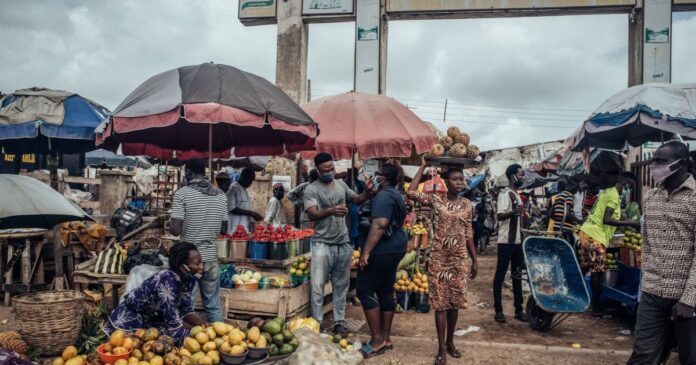By Jeph Ajobaju, Chief Copy Editor
There is no end in sight over the surging prices of soup condiments – onion, melon, pepper, oil, et cetera – and of staple foods, such as rice, beans, and garri, with the Central Bank of Nigeria (CBN) blaming herdsmen’s attacks against farmers.
The price hikes are caused by at least three major factors but the most dangerous and persistent is violent herdsmen preventing farmers from cultivating crops.
This means that, unless President Muhammadu Buhari changes his mind to arrest, prosecute, and deter Fulani herdsmen, food prices will rise for as long as the herdsmen roam free, kill villagers and farmers, and occupy their land with impunity.
A big bag of pepper, which sold for N15,000 in late May rose 17.6 per cent in the first week of June, and has further inched 66.7 per cent to sell for N25,000. The price of the medium size bag is up 30.8 per cent to N17,000.
A big bag of onion that sold for N18,250 in late May has shot 50.7 per cent to N27,500. It is expected to trend higher as the association of onion sellers has threatened to stop bringing onion from the North to the South from June 14.
This is the snapshot of the prices of food items that have surged in Lagos markets as traders lament the incessant hikes nationwide, according to the latest market survey by Nairalytics Research – the research arm of Nairametrics.
In March, data released by the National Bureau of Statistics (NBS) showed that food inflation rate jumped 21.79 per cent in February, the highest in 15 yeas dating back to October 2005.
The rise in Consumer Price Index (CPI) was caused by increases in the prices of bread and cereals, potato, yam, and other tubers; and there were also spikes in the prices of meat, food products, fruits, oil, and fats, vegetables, and fish.
Three major drivers of food inflation
There have been three major factors for the rise in the CPI since 2019.
First. Inflationary pressure, especially food inflation, was attributed to the closure of land borders in 2019.
Historical data shows that food inflation rate began persistent increases in September 2019, around the time Buhari closed land borders, which he reopened in December 2020.
Before then, the second factor of coronavirus pandemic movement restrictions which pivoted into lockdowns had added fuel to food price increases from March 2020.
Third. CBN Governor Godwin Emefiele explained in March this year that the uptick in food inflation is due to the worsening insecurity in across the country, especially in the food baskets of North Central and North East.
His words: “This persisting uptick in food inflation, however, was the major driving factor to the uptick in headline inflation. This was due to the worsening security situation in many parts of the country, particularly, the food-producing areas, where farmers face frequent attacks by herdsmen and bandits in their farms.
“While the Bank is intervening significantly in the agricultural sector, the rising insecurity in some food-producing areas is limiting the expected outcomes in terms of supply to the market, thus contributing to the rise in food prices.
“The [Monetary Policy] Committee further noted that the key drivers of the increase in core inflation included the hike in the price of Premium Motor Spirit (PMS), the upward adjustment in electricity tariffs, and the depreciation of the domestic currency (naira).”
The report by Nairametrics contains information on items that saw price stability, increases, and decreases.
Onion
Nairametrics sighted an influx of onion at Mile-12 market in Lagos where there was no enough space to display it. The trucks were parked in the market.
Despite the increased inventory the price of onion still surged as traders stock items in preparation for the halt in the transportation of onion to the South from June 14.
Mr Lastborn, as he called himself, told Nairametrics that a bag of new onion being brought to the market sells for at least N30,000 up from N28,000.
He attributed the price increase to the plan by the onion farmers association to stop bringing the spice to the South because of the banditry and killings North and South.
He said the price may increase further during the strike but expressed hope that it does not get as bad as it was in November 2020 when a bag of onion sold for N100,000.
Palm/groundnut oil
A 30-litre container of local palm oil now sells for N16,000 while a 25-litre of local groundnut oil costs N21,000.
Jonathan, a major oil dealer at Mile-12 market, said there are different types of groundnut oil, among them Devon Kings which sells for N21,500 and Super delicious oil N20,000.
Olaoluwa, a trader at Daleko market, explained that the incessant increase in the price of oil is unbearable because most Nigerians cook with a variety of oil – palm oil, groundnut oil, and vegetable.
Tomato
A big basked of oval-shaped tomato produced in the South West sells for N8,000.
It is less red compared to the round-shaped Northern variety which costs N24,000 per big bag.
Yahaya, who sells tomato at Mushin market, said most of the red round tomato is brought in from Zaria and Kano in the North West.
Oval tomato cultivated in the South West is harvested in the rainy season, he explained.
Melon
The price of a bag of melon has risen 8 per cent to N47,000.
Kelechi, a trader at Mile-12 market, said the rainy season has contributed to the rise in price as melon requires intense sun to dry.
Rice
A 50kg bag of foreign rice sells for N24,500 while that of local rice costs between N21,000 and N23,000 depending on the brand. Less quality rice, with pebbles in it, sells for N19,000.
Beans
The price of a 50kg bag of beans varies from N50,000 (white), N36,750 (brown) to
N29,500 (oloyin).
Rising prices
- A big bag of bush mango seed, popularly known as ogbono seed, now sells for N150,000 which is a 25 per cent increase against N120,000 in May.
- The biggest basket of round tomato goes for N24,000, representing a 45.5 per cent increase.
- The price of a medium size basket of round tomato is up 50 per cent to N12,000 compared to N8,000 in early June.
- A big bag of pepper has risen 66.7 per cent in price to N25,000 against N15,000 while the medium bag sells for N17,000.
- A big bag of garri (garri Ijebu) currently sells for N25,000 representing a 62.6 per cent increase compared to N15,375.
- A big basket of sweet potato that sold for N6,500 in late May has shot up 15.4 per cent to N7,500.
- A 25-litre container of palm oil has surged 14.8 per cent in price from N13,500 to N15,500. The price of five litres has increased 3.6 per cent to N2,850.
- A crate of 30 eggs has risen 1.6 per cent to N1,550.
- A big bag of melon now costs 8 per cent more, rising from N43,500 in late May to the current N47,000.
Lower price
Only crayfish reduced in price, now selling at N11,500 per bag against N11,750 in late May.
Stable prices
- A big bag of yellow maize still sells for N25,000 and white maize N24,625.
- A 12.5kg refill cooking gas continues to sell for N4,700 and 5kg N1,900.
- A 50kg bag of Honeywell flour remains at N15,125, Dangote flour (N15,375), Mama Gold (N14,825).
- A big basket of Irish potato sells for N15,000, the same as in late May.
- The prices of juice drinks, noodles, beverages, bread, tea, remain unchanged.
- A carton of full chicken still sells for N14,750 chicken lap (N14,750), and carton of turkey (N18,833).
- The price of a 50kg bag of white garri costs N17,750 the same as yellow garri.
- A big tuber of Abuja yam goes for N875 and medium size (N588).












